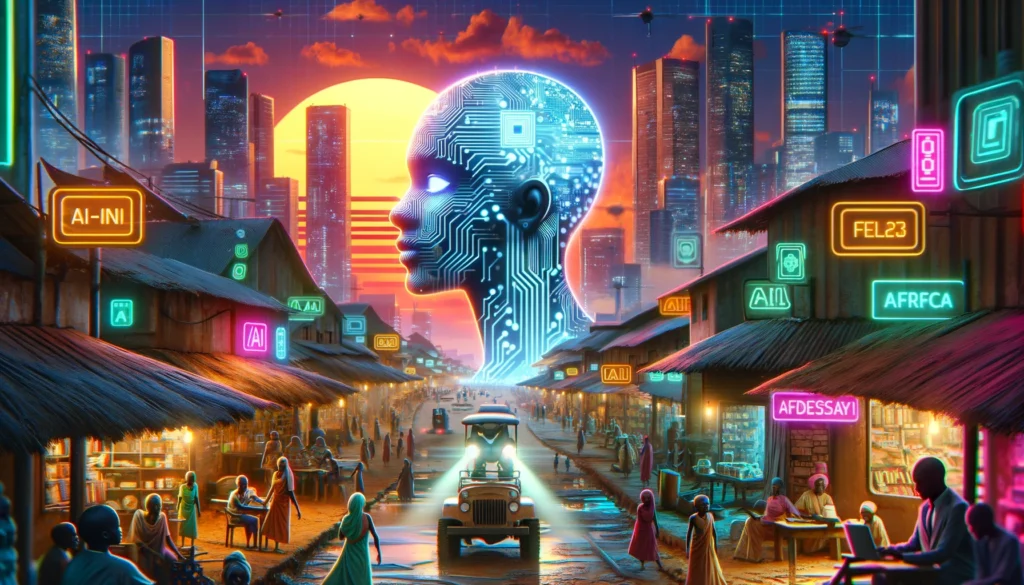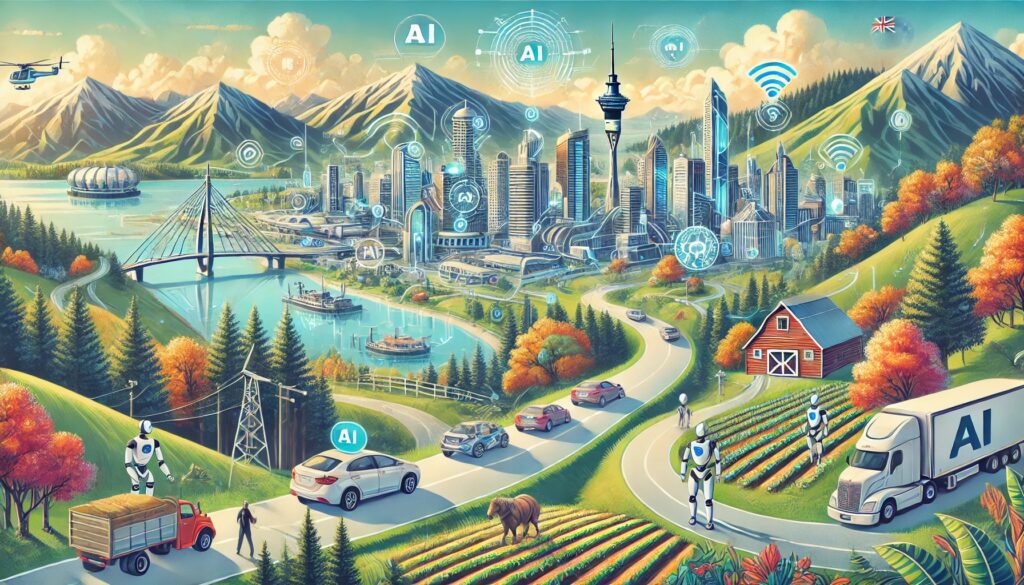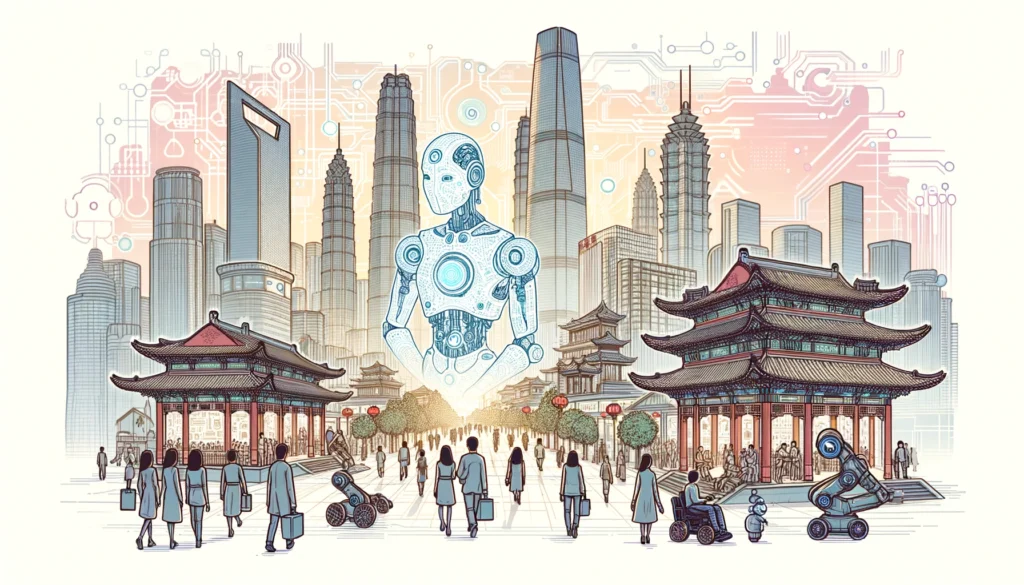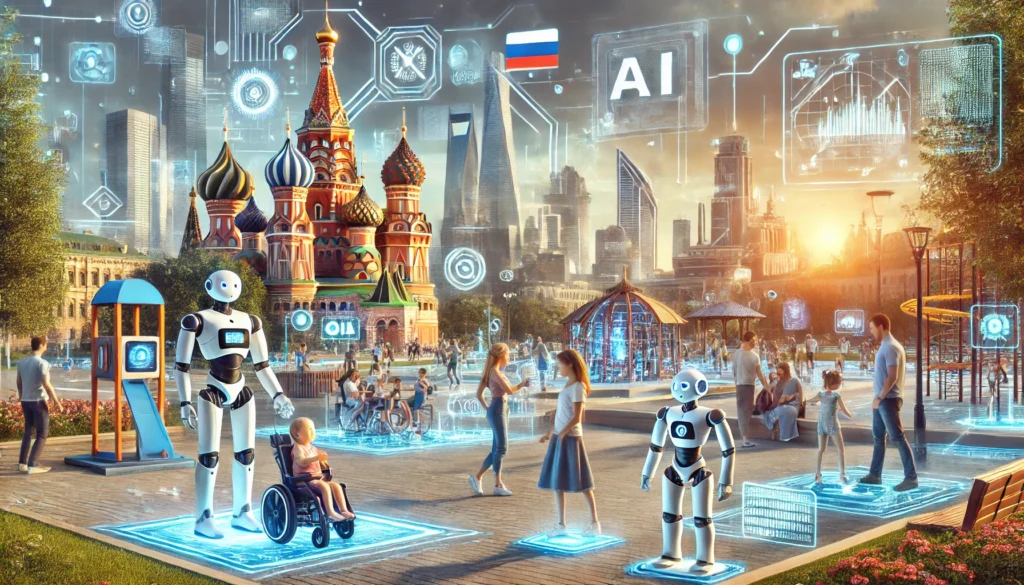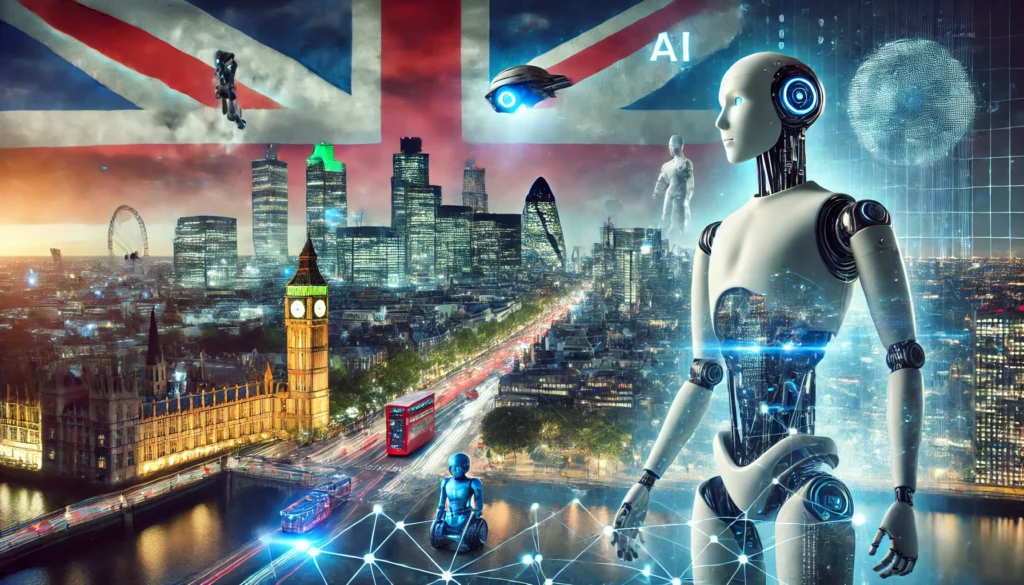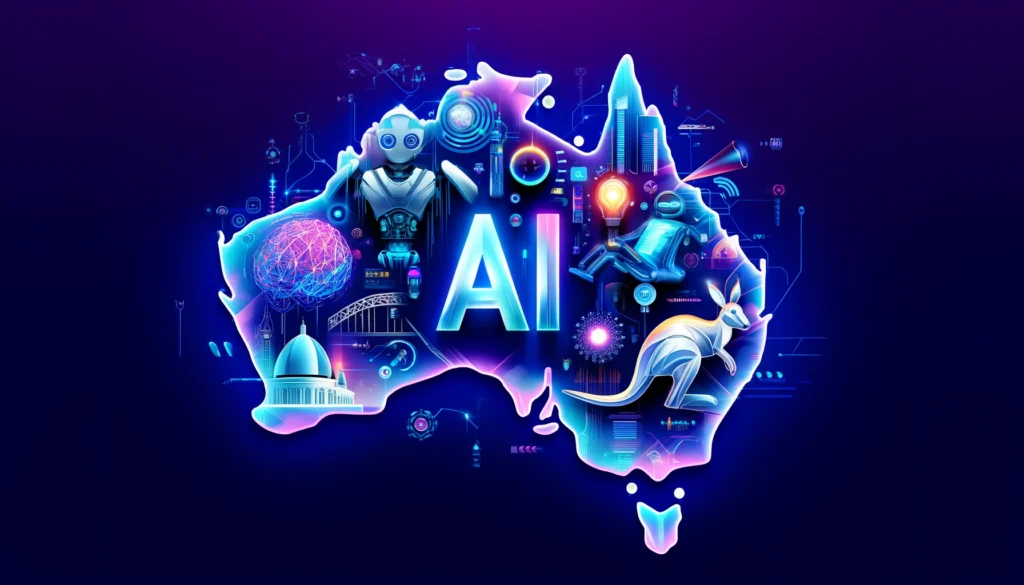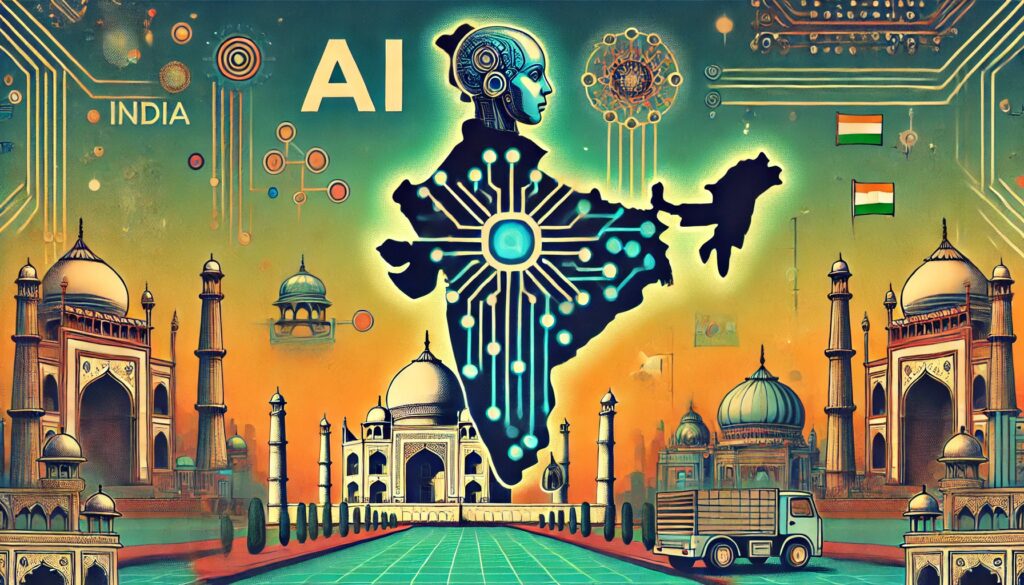
AI in India: Shaping a Brighter Future Across Sectors
- AI and Agriculture: Feeding a Growing Population
- Healthcare Revolution: AI as a Lifesaver
- Manufacturing: Boosting Efficiency and Innovation
- Education: AI as the Classroom Companion
- Financial Services: The AI-Driven Banking Experience
- Transportation: AI Driving the Future of Mobility
- Retail: AI Shaping the Shopping Experience
- Energy Sector: AI for a Sustainable Tomorrow
- E-commerce: AI Enhancing the Digital Marketplace
- AI in Entertainment: A New Frontier
- Telecommunications: Connecting India through AI
- AI in Startups: Fueling Innovation
- Government Initiatives: Driving AI Growth
- Challenges in AI Adoption: What India Needs to Overcome
- Government Initiatives and Policies for AI in India
- Future Prospects for AI in India
- Conclusion
India is rapidly embracing Artificial Intelligence (AI) to drive innovation and economic growth across various sectors. The government has launched numerous initiatives and policies to support AI development and adoption, focusing on areas such as healthcare, agriculture, education, smart cities, and mobility.
Key strategies include establishing research centers, providing funding and incentives, integrating AI into national programs, promoting skill development, and fostering international collaboration. These efforts aim to position India as a global leader in AI technology and its applications.
AI and Agriculture: Feeding a Growing Population
India’s vast agricultural sector has long faced challenges like unpredictable weather patterns, poor crop yields, and inefficient supply chains. But with AI at the helm, this traditional industry is getting a 21st-century makeover.
- Smart Farming: Farmers are now using AI-driven tools to analyze soil health, predict rainfall, and monitor crop conditions. With data in hand, they can make informed decisions, improving productivity and reducing waste.
- Precision Agriculture: AI is helping farmers apply fertilizers, pesticides, and water precisely where needed, reducing costs and environmental damage. This precision farming leads to better yields and more sustainable practices.
- Market Forecasting: AI helps predict market trends, enabling farmers to make better decisions about which crops to grow. By minimizing risks, farmers can ensure they get the best returns for their hard work.
Healthcare Revolution: AI as a Lifesaver
India’s healthcare system is vast but under immense pressure, especially in rural areas. AI is proving to be a game-changer, offering solutions to some of the country’s most pressing health challenges.
- Early Diagnosis and Predictive Analytics: AI algorithms can detect diseases at earlier stages, improving the chances of successful treatments. From cancer detection to predicting the likelihood of heart disease, AI is helping doctors make faster, more accurate diagnoses.
- Telemedicine: In a country where millions struggle to access quality healthcare, AI-powered telemedicine platforms are bridging the gap. Doctors can now consult with patients in remote areas, using AI to analyze medical data and offer personalized treatment plans.
- Drug Development: AI is speeding up the process of drug discovery, reducing the time and cost involved in bringing life-saving medications to market. It’s already being used to develop treatments for diseases that disproportionately affect India’s population, like tuberculosis and malaria.
Manufacturing: Boosting Efficiency and Innovation
India’s manufacturing sector is being overhauled thanks to AI and machine learning. These disruptive technologies are enhancing productivity, minimizing errors, and enabling manufacturers to innovate like never before.
- Predictive Maintenance: AI is helping factories predict when machines are likely to fail, allowing for repairs to be made before breakdowns occur. This minimizes downtime and reduces costs, making operations more efficient.
- Robotics and Automation: With AI-guided robots, tasks that were once tedious or dangerous can now be completed with precision and safety. This automation is leading to faster production times and higher-quality products.
- Supply Chain Optimization: AI helps manufacturers streamline their supply chains by predicting demand, optimizing inventory, and managing logistics. This not only reduces costs but also ensures products reach consumers faster.
Education: AI as the Classroom Companion
Education is one of the pillars of India’s growth, and AI is playing a pivotal role in reshaping how students learn. With personalized learning systems and intelligent tutoring, AI is becoming a companion in every classroom.
- Personalized Learning: AI-powered platforms are able to tailor lessons according to each student’s strengths and weaknesses. This individual attention helps students grasp complex concepts at their own pace.
- Smart Content: AI is transforming textbooks into interactive learning modules. With multimedia elements and virtual tutors, students can engage with content in a way that’s both fun and effective.
- Assessment and Feedback: AI simplifies the grading process by quickly evaluating student performance and providing feedback. This allows teachers to focus more on instruction while ensuring students get the support they need to succeed.
Financial Services: The AI-Driven Banking Experience
AI is bringing India’s financial sector into the digital age, offering seamless services and fraud prevention. Banking and finance have never been more customer-focused.
- Fraud Detection: AI algorithms can detect suspicious transactions in real-time, protecting consumers and banks from fraud. This proactive approach minimizes risks and ensures that financial transactions remain secure.
- Personalized Financial Advice: AI-powered chatbots and virtual assistants help consumers manage their finances, offering tips on saving, investing, and budgeting based on individual preferences and spending habits.
- Loan Approval and Credit Scoring: AI is speeding up loan approval processes and offering more accurate credit scores. By analyzing vast amounts of financial data, AI systems can quickly determine creditworthiness, ensuring that loans are disbursed efficiently.
Transportation: AI Driving the Future of Mobility
India’s transportation landscape is rapidly evolving, thanks to AI innovations that are making mobility smarter, safer, and more sustainable.
- Autonomous Vehicles: AI is paving the way for autonomous vehicles, which could soon become a reality on Indian roads. With advancements in self-driving technology, the future of transportation looks both exciting and futuristic.
- Traffic Management: AI systems are helping cities manage traffic congestion by analyzing patterns and predicting busy periods. This reduces bottlenecks and improves the overall flow of traffic in India’s bustling urban centers.
- Smart Public Transportation: AI is enhancing public transportation by optimizing routes, scheduling, and maintenance. This makes public transit more reliable and efficient, encouraging people to choose eco-friendly options over private vehicles.
Retail: AI Shaping the Shopping Experience
The retail industry in India is evolving rapidly, and AI is central to creating more personalized, efficient shopping experiences both online and in physical stores.
- Customer Insights and Behavior Analysis: AI helps retailers understand customer preferences and predict purchasing behaviors. This allows for highly targeted marketing strategies and product recommendations tailored to individual consumers.
- Inventory Management: AI systems ensure that retailers stock the right products at the right time. By analyzing data from sales trends and seasonal demand, retailers can avoid overstocking or understocking items.
- Enhanced Shopping Experience: From virtual shopping assistants to AI-driven kiosks, the retail experience is becoming more interactive. Customers can now get personalized recommendations or even try on clothes virtually, transforming how people shop.
Energy Sector: AI for a Sustainable Tomorrow
AI is helping India meet its growing energy demands while promoting sustainability. From optimizing power grids to supporting renewable energy initiatives, AI is powering India’s energy future.
- Smart Grids: AI systems monitor and manage electricity grids, ensuring efficient distribution and minimizing power outages. These smart grids also help integrate renewable energy sources like solar and wind.
- Energy Consumption Optimization: AI helps consumers and businesses alike manage their energy usage more efficiently. From smart homes that adjust power consumption to businesses that monitor and reduce energy waste, AI is promoting energy-saving habits.
- Renewable Energy Forecasting: AI is also improving the accuracy of renewable energy forecasting, predicting the availability of wind and solar power with better precision. This ensures that green energy can be harnessed effectively and reduces dependence on fossil fuels.
E-commerce: AI Enhancing the Digital Marketplace
India’s e-commerce industry has grown rapidly in recent years, and AI is playing a crucial role in making online shopping more convenient and efficient for both consumers and businesses.
- Personalized Shopping Experiences: AI-driven algorithms analyze browsing behavior and purchase history to recommend products that shoppers are most likely to buy. This personalized touch increases customer satisfaction and loyalty.
- Dynamic Pricing: AI enables dynamic pricing strategies that adjust prices in real-time based on demand, competition, and market trends. This helps businesses stay competitive and optimize revenue.
- Customer Support with AI Chatbots: Many e-commerce platforms use AI chatbots to provide 24/7 customer service. These chatbots can answer frequently asked questions, process returns, and help customers with their orders, making the online shopping experience smoother.
- Fraud Detection in Transactions: AI systems monitor transactions for any signs of fraud, such as unusual spending patterns or unauthorized access to accounts. This helps e-commerce platforms maintain a secure environment for shoppers.
AI in Entertainment: A New Frontier
India’s entertainment industry, from Bollywood to music streaming, is evolving with the help of AI. This is changing how content is produced, consumed, and even marketed.
- Content Personalization: Streaming services like Netflix and Spotify use AI to recommend shows, movies, and music based on user preferences. This helps users discover content they’re more likely to enjoy, enhancing the overall experience.
- AI in Film Production: AI is also influencing the creative side of filmmaking. From scriptwriting assistance to editing, AI tools are helping directors and producers streamline the production process, ensuring higher-quality films.
- Music Composition: AI algorithms are being used to compose music, creating soundtracks that match the mood and tone of a scene. This is pushing creative boundaries and offering composers new ways to experiment with their art.
- Targeted Advertising: AI-driven advertising campaigns in the entertainment sector are reaching the right audience more effectively. By analyzing data from social media and streaming platforms, AI tailors ads to specific viewer preferences.
Telecommunications: Connecting India through AI
India’s telecommunications industry is another area where AI is making significant strides. With millions of users across the country, AI is helping telecom companies improve services and customer experiences.
- Network Optimization: AI is used to optimize telecom networks by predicting traffic patterns and adjusting resources accordingly. This ensures that customers experience fewer dropped calls and faster internet speeds, even during peak times.
- Customer Service Automation: Telecom providers are using AI chatbots and virtual assistants to handle customer inquiries and resolve issues. This reduces wait times and improves customer satisfaction, especially for common issues like billing or service upgrades.
- Predictive Maintenance of Networks: AI helps telecom operators predict and address network failures before they happen. By analyzing patterns and identifying potential weak points, operators can ensure smoother connectivity.
- Fraud Detection: Just like in financial services, AI is helping telecom companies detect and prevent fraud, such as SIM card cloning and unauthorized access to customer accounts.
AI in Startups: Fueling Innovation
India’s booming startup ecosystem is leveraging AI to fuel innovation across various sectors. From fintech to healthtech, AI is helping startups disrupt industries and create new business models.
- AI-Powered Solutions for Social Impact: Many Indian startups are using AI to solve pressing social issues, such as education inequality and healthcare access. For example, AI-driven platforms provide personalized learning solutions for underprivileged students or offer remote healthcare to rural areas.
- AI and Fintech: Indian fintech startups are using AI to enhance financial inclusion by offering digital banking, micro-loans, and investment platforms that are accessible to everyone, even in rural regions. AI’s ability to analyze financial data is helping startups offer services that were once only available to large banks.
- Data Analytics Startups: AI-powered data analytics is a growing field among Indian startups. By helping businesses make sense of the vast amounts of data they collect, these startups are offering companies insights that drive better decision-making.
- AI in Retail Startups: Retail startups are using AI to transform customer experiences, manage inventory, and optimize supply chains, making them more competitive in the crowded Indian marketplace.
Government Initiatives: Driving AI Growth
The Indian government has recognized the potential of AI and is actively pushing for its adoption across industries, creating an environment conducive to AI innovation and integration.
- AI in Public Services: AI is being integrated into public services to streamline administrative processes, reduce corruption, and improve governance. For example, AI is used to analyze data from public welfare programs to ensure resources reach the right people.
- National AI Strategy: The Indian government has launched the National AI Strategy, which aims to make India a global leader in AI research and development. This includes setting up AI research centers, promoting AI education, and encouraging public-private partnerships.
- AI in Defense: The government is also exploring the use of AI in defense to improve surveillance, enhance cybersecurity, and support the development of autonomous military technologies.
- AI for Urban Development: In smart cities projects across India, AI is being used for urban planning, traffic management, waste management, and energy efficiency. This is helping cities become more livable and sustainable as they grow rapidly.
Challenges in AI Adoption: What India Needs to Overcome
While AI has vast potential, there are still several challenges that need to be addressed for its full implementation in India.
- Data Privacy Concerns: With the widespread use of AI, there are growing concerns about data privacy. Safeguarding personal data and ensuring transparent AI systems is a critical issue that needs more attention.
- Skilled Workforce Shortage: India faces a shortage of skilled AI professionals, which could slow down the pace of AI adoption. To keep up with global advancements, India needs to invest in AI education and training programs.
- Infrastructure and Accessibility: In rural areas, where internet connectivity and technological infrastructure are lacking, the benefits of AI may not reach everyone. Bridging this digital divide will be essential to ensure that AI’s advantages are felt across the country.
- Ethical AI Development: As AI continues to evolve, ensuring that these technologies are developed and used ethically is a pressing concern. From biased algorithms to transparency in decision-making, India must prioritize ethical AI practices.
Government Initiatives and Policies for AI in India

India is taking significant steps to integrate Artificial Intelligence (AI) into various sectors, aiming to drive innovation and economic growth. Here’s an overview of key government initiatives and policies that foster AI development and adoption in India.
1. National AI Strategy
Implementing the National Strategy for Artificial Intelligence by NITI Aayog: NITI Aayog, India’s policy think tank, has developed a comprehensive National Strategy for Artificial Intelligence. This strategy leverages AI for inclusive growth and focuses on critical areas like healthcare, agriculture, education, smart cities, and mobility.
Establishing centers of excellence for AI research and development: To foster innovation, the government is establishing centers of excellence (CoEs) across the country. These CoEs will be hubs for AI research, offering state-of-the-art facilities and resources to researchers and startups, significantly advancing AI technologies and applications.
2. Funding and Incentives
Providing grants and incentives for AI startups and research projects: The Indian government offers various grants and incentives to encourage AI startups and research projects. This financial support reduces barriers to entry for innovative startups and promotes groundbreaking research in AI.
Encouraging investment in AI through public-private partnerships: Public-private partnerships (PPPs) attract investment in AI. By collaborating with private enterprises, the government leverages additional resources and expertise, accelerating AI development and deployment across different sectors.
3. Digital India Initiative
Integrating AI into the Digital India initiative to enhance digital services and governance: AI is integrated into the Digital India initiative to improve the efficiency and effectiveness of digital services. This includes using AI for better governance, data analysis, and service delivery, ensuring that government services are more accessible and user-friendly.
Leveraging AI to improve public service delivery and citizen engagement: AI technologies enhance public service delivery by automating processes, improving data management, and providing personalized services. AI-driven chatbots and virtual assistants are examples of how AI improves citizen engagement and service delivery.
4. Skill India Mission
Incorporating AI training into the Skill India mission to develop a future-ready workforce: The Skill India mission incorporates AI training programs to prepare the workforce for the future. These programs focus on providing essential AI skills and knowledge to students and professionals, ensuring they are equipped to work with advanced technologies.
Promoting AI literacy and awareness among students and professionals: Efforts promote AI literacy and awareness through workshops, seminars, and educational programs. This initiative aims to build a strong foundation of AI knowledge across various educational levels and professional fields.
5. International Collaboration
Engaging in international collaborations for AI research and development: India actively engages in international collaborations to advance AI research and development. By partnering with other countries and international organizations, India shares knowledge, resources, and best practices to drive AI innovation.
Participating in global AI forums and initiatives to stay abreast of advancements: Participation in global AI forums and initiatives keeps India updated with the latest advancements in AI. This involvement helps in understanding global trends, setting standards, and ensuring that India remains competitive in the global AI landscape.
Future Prospects for AI in India
- AI-Driven Startups
Encouraging the growth of AI-driven startups across various sectors: India is fostering the growth of AI-driven startups by providing a supportive ecosystem. Government initiatives focus on nurturing startups in healthcare, agriculture, finance, and more, offering financial support, mentorship, and networking opportunities.
Creating incubation centers and innovation hubs to support AI entrepreneurship: The government is establishing incubation centers and innovation hubs to support AI startups. These centers provide resources such as access to advanced technology, expert guidance, and funding opportunities, fostering creativity and collaboration.
- Research and Innovation
Promoting interdisciplinary research in AI and related technologies: India emphasizes the importance of interdisciplinary research to advance AI. By bringing together experts from various fields, collaborative research projects can lead to breakthroughs in AI applications.
Investing in AI innovation labs and research centers across the country: Significant investments are being made to establish AI innovation labs and research centers equipped with advanced tools and technologies. These facilities provide a conducive environment for researchers and innovators to develop novel AI technologies and applications.
- AI for Social Good
Leveraging AI to address societal challenges such as poverty, inequality, and climate change: AI holds the potential to tackle pressing societal issues by developing solutions to combat poverty, reduce inequality, and address climate change. AI-powered analytics can identify root causes and suggest effective interventions.
Developing AI solutions for improving public health, education, and infrastructure: AI can significantly improve public health by enabling early disease detection and personalized treatment plans. In education, AI-driven personalized learning platforms can enhance learning outcomes, while AI optimizes infrastructure development by improving urban planning and resource management.
Conclusion
India is on the cusp of an AI revolution that promises to transform industries, improve lives, and drive economic growth. By leveraging AI in sectors like agriculture, healthcare, manufacturing, and education, the country is paving the way for a future full of innovation. However, to fully realize AI’s potential, India must address challenges like data privacy, infrastructure, and the need for skilled professionals. As AI continues to evolve, India’s journey into this exciting new era is just beginning, and the possibilities are limitless.
